Jason Micheli's Blog, page 41
June 3, 2024
On Illiberalism and Litmus Tests
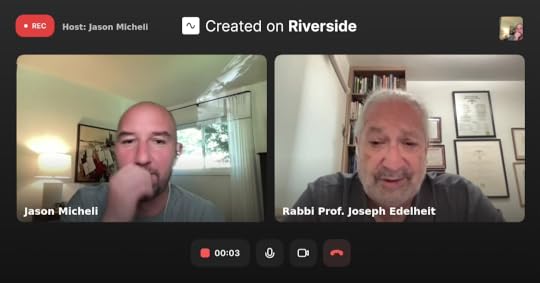
Tamed Cynic is a reader-supported publication. If you appreciate the work, consider becoming a paid subscriber.
Here is a recent conversation in which Rabbi Joseph and I discuss James Kirchik’s editorial in The NY Times, “A Chill Has Fallen Over Jews in Publishing.”
Show NotesSummary
The conversation delves into the impact of the Israeli-Palestinian conflict on the Jewish community, the stigmatization of Zionists, and the weaponization of language. It also explores the challenges of liberalism, the imposition of ideological litmus tests, and the complexity of human behavior and beliefs.
Takeaways
The Israeli-Palestinian conflict has led to stigmatization and marginalization of Zionists and Jews, fueling hatred and divisiveness.
The weaponization of language and the imposition of ideological litmus tests pose a threat to freedom of speech and dissent in democratic societies.
The conversation highlights the challenges of navigating complex human behavior, beliefs, and the need for understanding and dialogue in the face of polarization and exclusion.
Sound Bites
"The Israeli-Palestinian conflict has led to stigmatization and marginalization of Zionists and Jews, fueling hatred and divisiveness."
"The weaponization of language and the imposition of ideological litmus tests pose a threat to freedom of speech and dissent in democratic societies."
"The conversation highlights the challenges of navigating complex human behavior, beliefs, and the need for understanding and dialogue in the face of polarization and exclusion."
 Get more from Jason Micheli in the Substack appAvailable for iOS and AndroidGet the app
Get more from Jason Micheli in the Substack appAvailable for iOS and AndroidGet the app
June 1, 2024
Q: Are God and his love not active outside the church?

Tamed Cynic is a reader-supported publication. If you appreciate the work, consider paying it forward by becoming a paid subscriber.
Thinking about the intersections and dissonances between popular religion, classical theism, and biblical dogma, I decided to revisit and finally finish a catechism I began writing a decade ago. Thanks to a long vacation called cancer I never completed it. My plan is to rework what I had written, as God has made me otherwise than who I was back then, and to write new entries for the questions that I left unaddressed.
There is a long tradition in the historic church, especially in the Reformation, of distilling the faith down into concise questions and answers with brief supporting scriptures. As Luther intended his own Small Catechism, the Q/A's of a catechism are, really, the pretense for a longer dialogue, in Luther’s case a conversation between parents and their children. Given the post-Christian world in which we will live, I think it's important to outline the faith such that people can see— and learn— the philosophical foundation beneath it. It's important for people, in and out of the faith, to see that ours is a faith which isn't afraid of doubt even as it takes the reasons for doubt with moral seriousness. Ours is a faith that has ancient answers for modern questions, a faith that will always rely upon God's self-revelation but it is not irrational for all truth is God's truth. In other words, ours is a faith with the resources to tame the cynicism of a post-Christian culture.
You can see my last entry:
 Tamed CynicQ: How has God shown his love for us?Tamed Cynic is a reader-supported publication. If you appreciate the work, pay it forward by becoming paid subscriber. I appreciate it. Thinking about the intersections and dissonances between popular religion, classical theism, and biblical dogma, I decided to revisit and finally finish a catechism I began writing a decade ago. Thanks to a long vacation called cancer I never completed it. My plan is to rework what I had written, as God has made me otherwise than who I was back then, and to write new entries for the questions that I left unaddressed…Read more10 days ago · 3 likes · Jason Micheli24. Are God and his love not active outside the church?
Tamed CynicQ: How has God shown his love for us?Tamed Cynic is a reader-supported publication. If you appreciate the work, pay it forward by becoming paid subscriber. I appreciate it. Thinking about the intersections and dissonances between popular religion, classical theism, and biblical dogma, I decided to revisit and finally finish a catechism I began writing a decade ago. Thanks to a long vacation called cancer I never completed it. My plan is to rework what I had written, as God has made me otherwise than who I was back then, and to write new entries for the questions that I left unaddressed…Read more10 days ago · 3 likes · Jason Micheli24. Are God and his love not active outside the church?
May 31, 2024
Christians Must Be Christians Inside and Outside the Church

Tamed Cynic is a reader-supported publication. If you appreciate the work, pay it forward by becoming a paid subscriber! Much appreciation for those who do.
“Rulers consider it freedom to be able to do whatever he wants, to make his wishes into actions! Such a person can do many things, but not one particular thing: serve!”
— Karl Barth
If you’re already weary of the incessant speculation following yesterday’s verdict, here is our discussion of Thesis 4 of the Barmen Declaration:
Show Notes
“You know that the rulers of the Gentiles lord it over them, and their great ones are tyrants over them. It will not be so among you; but whoever wishes to have authority over you must be your servant.” Matt. 20:25-26
The various offices in the Church do not provide a basis for some to exercise authority over others but for the ministry [lit., “service”] with which the whole community has been entrusted and charged to be carried out.
We reject the false doctrine that, apart from this ministry, the Church could, and could have permission to, give itself or allow itself to be given special leaders [Führer] vested with ruling authority.
Summary
The conversation explores the themes of servant leadership, authority in the church, natural theology, and the role of Christians in civil society. It delves into the rejection of false doctrine and the impact of political situations on theological discourse. The conversation delves into the intersection of politics and Christianity, highlighting the dangers of seeking power and glory in the church and the political domain. It emphasizes the importance of servant leadership and the role of the laity in speaking out and bearing witness to the Lordship of Christ. The discussion also touches on the nature of leadership, the impact of anxiety in relational systems, and the need for love and empowerment within the church community.
Takeaways
Servant leadership emphasizes serving the church and Jesus through the church, rather than promoting personal agendas.
The rejection of false doctrine challenges the idea of special leaders and emphasizes the authority of Christ in the church.
Natural theology is critiqued for viewing God through human assumptions and prejudices, leading to self-service and a lack of consideration for others.
The conversation highlights the impact of political situations on theological discourse, particularly in the rejection of special leaders and the role of Christians in civil society. The dangers of seeking power and glory in the church and the political domain
The role of the laity in speaking out and bearing witness to the Lordship of Christ
The impact of anxiety in relational systems and the need for love and empowerment within the church community
Sound Bites
"The rejection of special leaders is directed explicitly at the political situation of the day, challenging the notion of a special leader in civil society."
"American Christianity has lost its power, glory, and domination over the culture."
"A good leader is always going to be a disappointment because a good leader will have to admit his or her own abilities and limits and failures."
"This demonstrates how dangerous it is to separate a high Christology from a low Christology."
 Get more from Jason Micheli in the Substack appAvailable for iOS and AndroidGet the app
Get more from Jason Micheli in the Substack appAvailable for iOS and AndroidGet the app
May 29, 2024
To Know the Ten Commandments is to Know the Entire Scriptures

Tamed Cynic is a reader-supported publication. If you appreciate the work, pay it forward by becoming paid subscriber! Much appreciation to those who do.
The Old Testament lectionary text for the Second Sunday after Pentecost is Deuteronomy 5:12-15:
Observe the sabbath day and keep it holy, as the LORD your God commanded you. Six days you shall labor and do all your work. But the seventh day is a sabbath to the LORD your God; you shall not do any work--you, or your son or your daughter, or your male or female slave, or your ox or your donkey, or any of your livestock, or the resident alien in your towns, so that your male and female slave may rest as well as you. Remember that you were a slave in the land of Egypt, and the LORD your God brought you out from there with a mighty hand and an outstretched arm; therefore the LORD your God commanded you to keep the sabbath day.
The Lord commands a people to worship him only after the Exodus; however, this covenant is a priori in the aim of God. The Book of Esdras professes plainly, “It was for us that you created the world.” The order is important.
Creation serves the covenant; the covenant does not serve creation.Thus, even though the commandments come later at Mount Sinai they are a priori in the creative aim of God.
May 28, 2024
From Drug Trafficker to Gospel Preacher

Tamed Cynic is a reader-supported publication. If you appreciate the work, pay it forward by becoming a paid subscriber! Seriously, Slice is Exhibit A— it’s worth it.
Thanks to a mutual friend, I’ve been fortunate to have befriended a divinity student with a remarkable witness to the stubborn grace of God in Jesus Christ. Slice Penny is a third year student at Duke and a licensed pastor in the UMC. Be on the lookout for the sermon he’ll preach for me later this summer.
If you appreciate Slice’s story, leave a comment so he can show his Mom.
Show NotesSummary
A story of redemption and transformation from a life of addiction and crime to faith and purpose. It covers the journey of a former drug dealer and addict who found his calling to become a pastor after a life-changing experience in prison and a spiritual awakening. This conversation covers the journey of Slice, a recovering drug addict and ex-convict, as he navigates his calling to become a minister. It explores his experiences in ministry, seminary, and the challenges he faces in being accepted by the church community. Slice story is one of redemption, faith, and the transformative power of grace.
Takeaways
The power of faith and spiritual transformation in overcoming addiction and finding purpose.
The impact of supportive mentors and spiritual guidance in the journey of redemption.
The importance of humility, grace, and forgiveness in the process of personal transformation.
The role of community and education in facilitating a path to a new life and purpose.
The significance of prayer and spiritual formation in the journey of faith and personal growth. Slyce's journey is a powerful testament to the transformative power of faith and grace.
The challenges Slyce faces in being accepted by the church community highlight the need for inclusivity and open-mindedness within religious institutions.
Slyce's experiences in ministry and seminary shed light on the complexities of pursuing a calling in the face of personal struggles and societal judgment.
Sound Bites
"The risen Jesus is the only explanation for where in life you are right now."
"I gotta go back to school. I gotta go back to school and my body locked and I fell into the swimming pool, sank to the bottom."
"I brought you here so Ricky could get you through prison and you could get Ricky out of prison."
"I just kept feeling like God's called me to fight, but I'm like, I don't know how this is gonna work."
"I believe God was giving me the courage to step out on faith."
"What's it like to go from that isolating shame to just being the object of just pure pride?"
 Get more from Jason Micheli in the Substack appAvailable for iOS and AndroidGet the app
Get more from Jason Micheli in the Substack appAvailable for iOS and AndroidGet the app
May 27, 2024
"Renunciation of violence can never be the calling of all"

Tamed Cynic is a reader-supported publication. If you appreciate the work, pay it forward by becoming paid subscriber!
Memorial Day
May 26, 2024
The Moral Claim in the Triune Name

Tamed Cynic is a reader-supported publication. If you appreciate my work, pay it forward by becoming a paid subscriber!
May 25, 2024
The War Against the Jewish Story
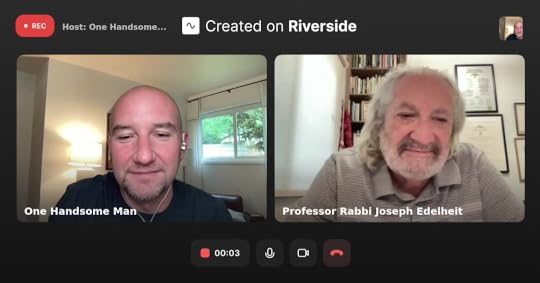
Tamed Cynic is a reader-supported publication. If you appreciate the work, pay it forward by becoming a paid subscriber! Much love for those who do!
Hi Friends,
Here is a recent conversation with Rabbi Joseph Edelheit about Yossi Klein Halevi’s piece, “The War Agains the Jewish Story.”
Show NotesSummary
The conversation explores the issue of anti-Semitism on college campuses and the distortion of the Jewish story. It discusses the lack of historical context and the demonization of Israel and Zionism. The conversation emphasizes the need for a nuanced understanding of the Israeli-Palestinian conflict and the importance of teaching the unique history of the Jewish people. It also addresses the role of Holocaust education and the rise of anti-Semitism in academia. The conversation concludes with a call for dialogue and understanding between Jews and Christians. The conversation explores the themes of Jewish identity, the Holocaust, the Israeli-Palestinian conflict, and the complexity of history and storytelling. It delves into the tension between universal and particularistic aspects of Jewish identity, the challenges of remembering and commemorating the Holocaust, and the impact of the October 7th attack on Israel. The conversation also touches on the Israeli government, the role of Hamas, and the difficulty of finding common ground in dialogue. Overall, it highlights the need for nuanced understanding and empathy in navigating these complex issues.
Takeaways
Anti-Semitism on college campuses is a growing concern, with the Jewish story being distorted and demonized.
There is a lack of historical context and understanding of the Israeli-Palestinian conflict, leading to the oversimplification of complex issues.
Holocaust education needs to emphasize the uniqueness of anti-Semitism and the Jewish experience.
Dialogue and understanding between Jews and Christians are crucial for addressing anti-Semitism and promoting peace.
It is important to challenge and confront the systemic assault on the Jewish story and reclaim the narrative. The tension between universal and particularistic aspects of Jewish identity
The challenges of remembering and commemorating the Holocaust
The impact of the October 7th attack on Israel
The complexity of the Israeli-Palestinian conflict
The difficulty of finding common ground in dialogue
Sound Bites
"The anti-Zionist forces in academia have been preparing the ground for decades, systematically dismantling the moral basis of each stage of Zionist and Israeli history."
"The Israeli-Palestinian conflict has no binary way of understanding. It is not a good thing."
"Antisemitism is not merely the hatred of Jews as other, but the symbolization of the Jew."
"Accept me in all my universal, utopian, messianic strivings. I am a particular person."
"October 7th will go down as the single gravest day of Israeli failure to fulfill its single greatest purpose, to keep Jews safe."
"No one understood that the Nazis had determined they would do all they could to eliminate all Jews."
 Get more from Jason Micheli in the Substack appAvailable for iOS and AndroidGet the app
Get more from Jason Micheli in the Substack appAvailable for iOS and AndroidGet the app
May 24, 2024
Woe to the Church Who Speaks of Jesus in the Past Tense

Tamed Cynic is a reader-supported publication. If you appreciate the work, consider becoming a paid subscriber. Much appreciation for those who do!
Hi Friends,
Here is the recording from Monday’s session on Karl Barth and the Barmen Declaration.
You can join us for our final discussion of the Barmen Declaration on Monday as Barth scholar Marty Folsom joins us. Here’s the link.
And here are the slides from the session:
Barth Barmen 31.57MB ∙ PDF fileDownloadDownloadShow NotesSummary
In this conversation, Jason Micheli, Josh, and Todd discuss the third thesis of the Barman Declaration. They explore the historical context of Nazi Germany and the challenges faced by the Confessing Church. The conversation highlights the importance of the church being grounded in Jesus Christ and the Holy Spirit, rather than conforming to prevailing ideologies. They emphasize the need for the church to speak the truth in love and to testify as the community of pardoned sinners. The discussion also touches on the dangers of conflating the church with political ideologies and the importance of living out the message of grace and reconciliation. The conversation explores the themes of self-identification, the role of the church in the world, the importance of community, and the need for discernment in the church's message and order. It also touches on the eschatological nature of Christianity and the danger of conforming Jesus following to political tribes. The Barman Declaration serves as a guide for the church to resist the temptation to dilute its message and conform to cultural norms.
Takeaways
The church must be grounded in Jesus Christ and the Holy Spirit, rather than conforming to prevailing ideologies.
The church is called to speak the truth in love and testify as the community of pardoned sinners.
Conflating the church with political ideologies is dangerous and undermines the message of grace and reconciliation.
The church must live out the message it proclaims, embodying the values of grace, peace, and inclusion. Self-identification can lead to a lack of consistency and dilution of identity.
The church's role is to be a distinct community in the world, not conforming to cultural norms.
Community is essential for discernment and accountability in the Christian faith.
The church must be mindful of conforming its message and order to preconceived preferences.
Christianity is eschatological, with an expectation of Christ's second coming.
The church should resist the temptation to align itself with political tribes and prioritize gospel convictions over political convictions.
Sound Bites
"The church must reject the false doctrine that it can hand over its message and order to prevailing ideological and political convictions."
"The church is not the source of its own continuing life; it is grounded by Jesus Christ."
"Woe to the church that speaks of Jesus in the past tense; he is the living Lord of the church."
"This whole trend toward self-identification... I've declared to you what my identity is."
"It's up to the people around you to tell me whether or not you're actually a Christian."
"The church is threatened when it contests Jesus's statement, you are the salt of the earth, either by letting its savory message remain unused or by diluting it."
 Get more from Jason Micheli in the Substack appAvailable for iOS and AndroidGet the app
Get more from Jason Micheli in the Substack appAvailable for iOS and AndroidGet the app
May 23, 2024
God is Father, Jesus, and Holy Spirit.
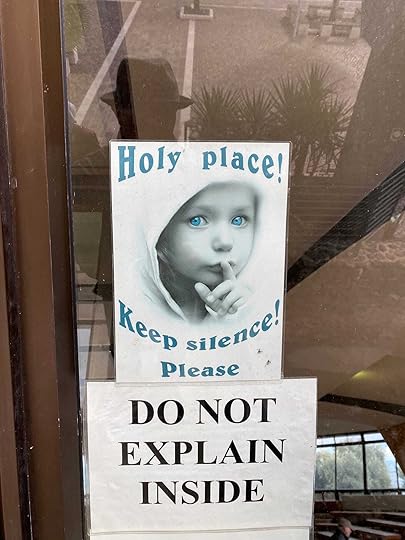
Tamed Cynic is a reader-supported publication. If you appreciate the work, pay it forward by becoming a paid subscriber! Much love to those who do!
Trinity Sunday
This Sunday culminates the long sweep of time from Lent through Eastertide and Pentecost. On the liturgical calendar, this Sunday is Trinity Sunday, the day when many of those whom Jesus has foolishly called commit theological malpractice, analogizing the triune identity to inanimate objects. Still others beat a retreat and, rather than proclaiming the name of the true God, whimper that the Trinity is a “mystery.” Never mind that in the scriptures “mystery” refers not to what is unknowable but to what has been revealed.
The Trinity is a mystery. It is not a puzzle.The doctrine of the Trinity sets us deep within the mystery of history and it forces us to repent of our pagan misapprehensions about the reality of the true God. The Trinity, as Robert Jenson writes, is “the frame within which theology’s mysteries can be shown and its puzzles solved.”
The true God is triune—
The true God is Father, Son, and Holy Spirit.
God is Father, Jesus, and Holy Spirit.
And Jesus is the word made flesh.
Jesus just is a word with body and blood.And because Jesus, as the creed attests, is “of one being with the Father,” the Father and the Spirit are likewise words.As the theologian Peter Brunner writes:
“In view of God’s triune nature…we must abandon all pictures of God that with the help of Plato’s mode of thought read into God a fixed, unmovable, and abstract perfection.”
According to the rule of faith, the doctrine of the Trinity demands two primary propositions.
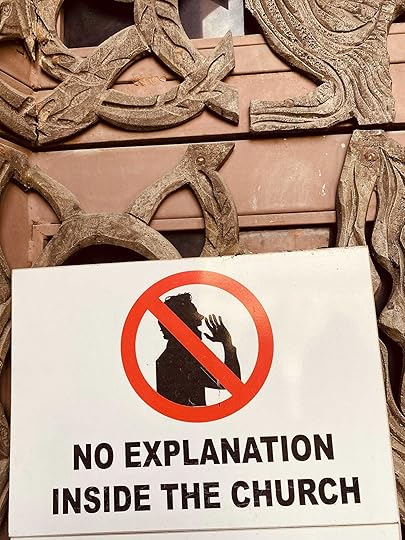 1. God is an event.
1. God is an event.God is not a static being. God is no more Aristotle’s Unmoved Mover than God is the Man Upstairs. Nor is God a timeless, ineffable mystery far beyond in a reality to which the Bible can only point. God is an event.
The kind of reality God has is like that of a kiss or a car accident or water washing over a child.
As Jason Isbell sings, “You thought God was an architect, now you know/He’s something like a pipe bomb ready to blow.” “24 Frames” is more theologically precise than “Immortal, Invisible, God Only Wise.”
 2. God is a particular sort of event, a verbal event.God is discourse, an exchange not a lecture.
2. God is a particular sort of event, a verbal event.God is discourse, an exchange not a lecture.Conversation, address and reply, call and response.
The Lord is his loquaciousness.
As Robert Jenson writes,
“It was the first deliberate dogma of Christianity, by which the faith forever defined its difference from other religions, that with Christianity’s God there is no silence from eternity, that we do not lose our voice and ears as we approach him, that he not only has a word for us— which is eccentric enough in the world of religion— but is his word for us…
The conversation that is God is not a conversation in heaven— at least, if by heaven we mean some other place than earth. The conversation that is God is the proclamation of the law and the gospel. Wherever human discourse occurs which opens human life to the last future, there is the occurrence of God.”
As mind-bending and mysterious as all this may sound, it is the plain teaching of Jesus, “Wherever two or three are gathered together in my name, there I am in the midst of them.”
It’s astonishing indeed but this teaching so saturates Christianity we seldom notice it. Paul puts it straightforwardly at the top of his letter to the Romans, “For I am not ashamed of the gospel. It is God at work [in the world.” This is why she who will be Jesus’s spouse, the church, is simultaneously also his body. The church is the body of the Risen Jesus precisely because the church is the location of the verbal event that is God. This is why, for example, to ask whether the water or the bread and the wine are just symbols misunderstands not only baptism and communion but misunderstands the reality that is God.
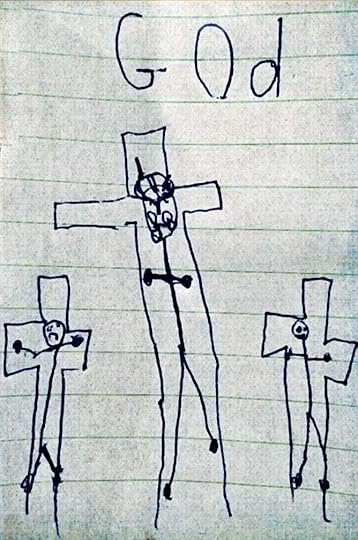 God is his word for us.Thus, the verbal event that is God necessarily includes us.
God is his word for us.Thus, the verbal event that is God necessarily includes us.Again, as mind bending and mysterious as this may strikes us, it is the straightforward teaching of Jesus, who commanded that we pray to his Father as our Father.
He listens to us.
Exactly because the Father loves the Son, he listens to his Son’s bride.And this is the way in which our passage forces not only to repent of our pagan notions of God but also sets us deep within the mystery of history.
That Jesus is a word with a body and blood, that God is a colloquy that includes us means that the prophetic community’s prayers and praise and proclamation are the events by which God happens in history.
Make no mistake, this means nothing less than that God sovereignly determines history but that God determines history not by arbitrary decisions in heaven but by deliberating with us. “Go and preach to the nations and kings,” the Lord commissions John; just so, history.
God determines history by listening to us about how that history should go.This means not only that God is responsible for the history he makes but also that God is on the hook— morally speaking— for choosing such unreliable partners as people like us.
Hence Martin Luther’s forthright maxim:
“If we look at how God governs history and judge by any standard known to us, then we must conclude either God is wicked or God is not.”
But any understanding of how God happens in the world that does not produce something like Luther’s maxim is not the claim made by the scriptures. As Jenson puts it in frank either/or terms,
Either prayer and praise and proclamation are absurd.Or they are “nothing less than our permitted mixing into the triune deliberation we call providence.”By our baptisms, we are invited to address God as the spouse of his Son, we are invited to offer opinions as to how he run his affairs, and we are invited even to speak for him in such a way that our speech for him is him.
 Get more from Jason Micheli in the Substack appAvailable for iOS and AndroidGet the app
Get more from Jason Micheli in the Substack appAvailable for iOS and AndroidGet the app
Jason Micheli's Blog
- Jason Micheli's profile
- 13 followers



